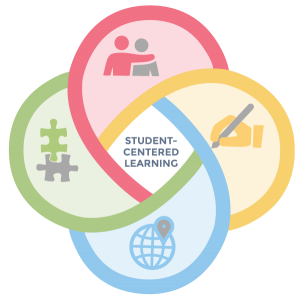Student-Centered Learning (SCL)

Synopsis
SCL is also known as flexible learning, independent learning, open/distance learning, participative learning, or self-managed learning. It focuses on the student’s needs, abilities, interests, and learning styles, with the teacher acting as a facilitator of learning. It puts students first in the teaching and learning pedagogy. SCL requires that students be active, responsible participants in their own learning. Table below highlights some useful SCL activities.
| Outside the classroom | In the classroom |
|---|---|
Independent projects | Buzz groups (short discussion in twos) |
Group discussion | Pyramids/Snowballing (buzz groups continuing the discussion into larger group) |
Peer mentoring of other students | Crossovers (mixing students into groups by letter/ number allocations) |
Debates | Rounds (giving turns to individual students to talk) |
Field trips | Quizzes |
Practicals | Writing reflections on learning (3–4 minutes) |
Reflective diaries, learning journals | Student class presentations |
Computer-assisted learning | Role playing |
Projects | Poster presentations |
Writing newspaper articles | Students producing mind maps in class |
Portfolio development | |
PBL | PBL (less complex problems) |
Case study | Case study (Simpler cases) |
Modular approach |
In addition to PBL, case study, and modular, PoPBL (Project-Based Problem-Based Learning) other SCL approaches should be taken into consideration.
| Other SCL Approaches | Definition of terms |
|---|---|
Collaborative | Working together to achieve a goal, but in its negative sense it is working as a traitor |
Contextual | Relating to, dependent on, or using context (e.g., contextual criticism of a book) |
Cooperative | A business organization owned and operated by a group of individuals for their mutual benefit |
Constructivist | A theory of knowledge that argues that humans generate knowledge and meaning from an interaction between their experiences and their ideas |
Inductive | Of, pertaining to, or involving electrical or magnetic induction |
Experiential | Pertaining to or derived from experience |
Simulation | The imitation of some real thing, state of affairs, or process; the act of simulating something generally entails representing certain key characteristics or behaviours of a selected physical or abstract system |
Read more:
Training Module Series: Student-Centered Learning (SCL) Approaches for Innovative Teaching by CDAE